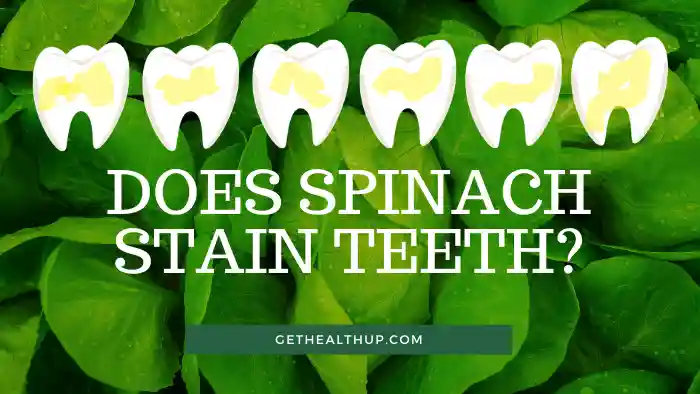Yes, spinach can potentially stain teeth. Spinach is healthy, but does it stain teeth? People wonder if this vegetable can leave marks on our teeth.
Luckily, spinach doesn’t cause much tooth discoloration. Unlike coffee or red wine, which have strong pigments that stick to enamel, spinach has only a low amount of these compounds.
Some might think that the green color of spinach can stain teeth, but its pigments aren’t powerful enough to go through the enamel.
Studies show that eating spinach regularly can even help oral health by improving gum health and reducing inflammation.
Understanding Spinach and Its Composition
Spinach is a widely eaten leafy green vegetable in many countries. It is known for its health benefits. Some believe that spinach can stain teeth.
Nutritional Value
Spinach is packed with vitamins and minerals, like vitamins A, C, and K, folate, iron, and calcium.
It also has antioxidants that protect against stress and inflammation. Spinach is unique because it has a lot of oxalic acid, a natural compound in many foods.
Some people think oxalic acid causes kidney stones, but it’s usually safe to eat in moderation.
Color Components
Spinach is green because of its color components, such as chlorophyll and carotenoids. Chlorophyll is a natural pigment in plants that helps with photosynthesis.
Carotenoids are pigments that make fruits and vegetables colorful. Spinach has two main carotenoids, lutein, and zeaxanthin, which are good for eye health and can lower the risk of age-related macular degeneration.
Spinach also has flavonoids, like quercetin, which are plant compounds that have antioxidant and anti-inflammatory properties.
Spinach doesn’t definitively cause teeth staining, despite its color components and high oxalic acid content.
Spinach and Teeth Staining
Spinach is a healthy green vegetable that is full of vitamins and minerals. But, can eating spinach stain your teeth? In this section, we will look at how staining happens and what factors can make it worse.
Mechanism of Staining
Spinach has a lot of oxalic acid, a natural compound in many foods. This acid can combine with calcium in the mouth to create calcium oxalate, which causes teeth stains.
These stains can be brown, yellow, or green spots on the enamel.
Factors Influencing Staining
Several factors can influence the extent to which spinach stains teeth. These factors include:
- Frequency of consumption: Eating spinach occasionally is unlikely to cause significant staining. However, consuming spinach regularly can increase the risk of staining.
- Preparation method: Cooking spinach can reduce its oxalic acid content, which may reduce the risk of staining. However, consuming raw spinach in salads or smoothies can increase the risk of staining.
- Oral hygiene: Maintaining good oral hygiene practices such as brushing and flossing can help prevent stains from forming on the teeth.
Conclusion
In conclusion, spinach can stain teeth because of its oxalic acid. However, you can reduce the risk by eating it in moderation, cooking it, and taking care of your teeth.
Frequently Asked Questions
Does spinach stain teeth?
No, spinach does not typically stain teeth.
Is spinach a teeth-staining food?
No, spinach is not known to cause teeth stains.
Will eating spinach discolor teeth?
No, consuming spinach does not usually lead to tooth discoloration.
Does spinach leave stains on teeth?
No, spinach generally does not leave any noticeable stains on teeth.
Can spinach cause teeth staining?
No, spinach is unlikely to cause staining of the teeth.

A Blogger, Author and Researcher! Gohar Aalam is recognized as a full-time blogger for Health and Tech Niches. I’m a Fountainhead of Gethealthup.com, will provides high quality knowledge.








